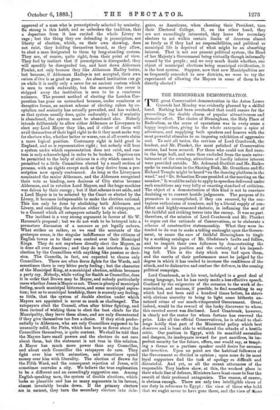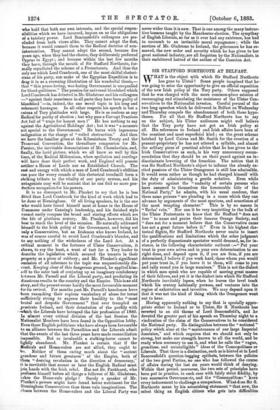THE BIRMINGHAM DEMONSTRATION.
THE great Conservative demonstration in the Aston Lower Grounds last Monday was evidently planned by a skilful hand. Nothing had been overlooked that could ensure for the proceedings the double charm of popular attractiveness and dramatic effect. The choice of Birmingham, the Holy Place of Radicalism, as the scene of operations was in every sense a happy inspiration, giving to the whole enterprise a spice of adventure, and supplying both speakers and hearers with the most powerful stimulus to an imposing exhibition of aggressive zeal. To suit all tastes, the services of Lord Cranbrook, the loudest, and Mr. Plunket, the most polished of Conservative orators, had been secured. For those who could not find room in the large ball, and were thus excluded from the main enter- tainment of the evening, attractions of hardly inferior interest were provided outside. Mr. Ashmead-Bartlett and Mr. Raikes spoke to resolutions in the Skating Rink, Mr. Grantham and Sir Richard Temple might be heard" on the dancing platform in the wood," and " Dr. Sebastian Evans presided at the meeting on the meadow." It would be unfair to apply to speeches delivered under such conditions any very lofty or exacting standard of criticism. The object of a demonstration of this kind is not to convince doubting or to convert hostile judgments. The purpose of its promoters is accomplished, if they can succeed, by the con- tagious enthusiasm of numbers, and by a liberal supply of con- fident and highly-seasoned rhetoric, in inflaming the zeal of the faithful and striking terror into the enemy. It was no part, therefore, of the mission of Lord Cranbrook and Mr. Plunket to argue out the rationale of Conservatism, or to elaborate a scheme of constructive statesmanship. What they were in- tended to do was to make a telling onslaught upon the Govern- ment, to cause the ears of faithful Birmingham to tingle by a scathing catalogue of Mr. Gladstone's faults and follies, and to inspirit their own followers by demonstrating the weakness of his position and the certainty of his impend- ing fall. This is the duty which was laid upon them, and the merits of their performance must be judged by the degree in which it has tended to increase the confidence of the- attack, and to dishearten and confuse the defence, in the coming. political campaign.
Lord Cranbrook, as is his wont, indulged in a good deal of strong language, but he has rarely made a less effective speech. Confined by the exigencies of the occasion to the work of de- nunciation and anxious, if possible, to find something to say which had not been said a hundred times before, he strove with obvious sincerity to bring to light some hitherto un- noticed crime of our much-vituperated Government. Great, indeed, would be the reward of the lucky discoverer to whom this coveted secret was disclosed. Lord Cranbrook, however, is clearly not the orator for whom fortune has reserved the prize. Like all the official Conservatives, he is afraid to chal- lenge boldly that part of the Ministerial policy which best deserves and is least able to withstand the attacks of a hostile critic. Our position in Egypt, with its manifold anomalies and dangers, its inadequate reward for past sacrifices, its im- perfect security for the future, offers, one would say, ail tempt- ing a theme as a partisan speaker could desire for sarcasm and invective. Upon no point are the habitual followers of the Government so divided in opinion ; upon none do its most loyal supporters find the task of apology so difficult and. distasteful. And yet, as all the recent utterances of the responsible Tory leaders show, at this, the weakest place in their whole line of defence, Ministers have least cause to fear the assault of their professed antagonists. The reason, of course,. is obvious enough. There are only two intelligible views of our duty in reference to Egypt : the view of those who hold that we ought never to have gone there, and the view of those
who hold that both our own interests, and the special respon- sibilities which we have incurred, impose on us the obligations of a tutelary power. Lord Beaconsfield's colleagues are pre- cluded from both views alike. They cannot adopt the first, because it would commit them to the Radical doctrine of non- intervention. They cannot adopt the second, because five years ago, when they had the choice, they deliberately preferred Cyprus to Egypt ; and because within the last few months they have, through the mouth of Sir Stafford Northcote, for- really repudiated the scheme of a Protectorate. And thus the only use which Lord Cranbrook, one of the most skilful rhetori- cians of his party, can make of the Egyptian Expedition is to drag it in as a crowning illustration of his wonderful thesis,-- that " this peace-loving, war-hating Government is unequalled for blood-guiltiness." The passion for universal bloodshed which Lord Cranbrook has detected in Mr. Gladstone and his colleagues —" against their conscience in all parts they have been guilty of bloodshed "—is, indeed, the one novel topic in his long and vehement harangue. In all other respects his speech is but a cat,ena of Tory platitudes writ large. He is as zealous as any Radical for purity of election ; but why pass a Corrupt Practices Act full of " traps for honest men ?" He has nothing to say against the Agricultural Holdings' Act ; but it was "a measure not special to the Government." He burns with ingenuous indignation at the charge of "veiled obstruction." And then we have the familiar gibes at the Kilmainham Treaty and the Transvaal Convention, the threadbare compassion for Mr. Forster, the inevitable denunciations of Mr. Chamberlain, and, finally, the lurid picture, which we all know so well by this time, of the Radical Millennium, when spoliation and sacrilege will have done their perfect work, and England will possess neither a House of Lords nor an Established Church. The rest and energy with which a man of Lord Cranbrook's abilities can pace the weary rounds of this rhetorical treadmill form a etriking tribute to the vitality of our party system, and his antagonists may well be content that he can find no more pro- ductive occupation for his powers.
It is no disrespect to Mr. Plunket to say that he is less fitted than Lord Cranbrook for the kind of work which had to he done at Birmingham. Of all living speakers, he is the one who would have found himself most at home in the House of Commons under Canning's leadership, and his finished style cannot easily compass the broad and staring effects which are the life of platform oratory. Mr. Plunket, however, did his beat to reach the level of the occasion. He naturally addressed himself to the Irish policy of the Government, and being not only a Conservative, but an Irishman who knows Ireland, he was of course careful to avoid Lord Cranbrook's blunder' and to say nothing of the wickedness of the Land Act. At a critical moment in the fortunes of Ulster Conservatism, it shows, to say the least, a want of tact for a Tory leader to describe the legislation which secured the tenants in their property as a piece of robbery ; and Mr. Plunket's significant omission of all reference to the topie was unquestionably dis- creet. Keeping clear of this dangerous ground, he applied him- self to the safer task of conjuring up an imaginary confederacy ly.tween Mr. Parnell and the Liberal party, and predicting its disastrous results to the country and the Empire. This is an old story, and the present seems hardly the most favourable moment for its revival. For months past Mr. Parnell's henchmen have been ransacking their copious vocabulary of abuse for terms *ufficiently strong to express their hostility to the "most brutal and despotic Government" that ever trampled on prostrate Ireland, and their detestation of the perfidy with --which the Liberals have betrayed the fair professions of 1880. Iu iihnost every critical division of the last Session the Nationalist Members have been found in the Opposition lobby. Even those English politicians who have always been favourable to an alliance between the Parnellites and the Liberals admit that the events of the last three years have made reconciliation impossible. But so invaluable a stalking-horse cannot be lightly abandoned. Mr. Plunket is certain that if the Radicals and Home-rulers are not allied, they ought to be. Neither of them caring much about the "ancient grandeur and future greatness" of the Empire, both of Chem "desiring revolution in the direction of democracy," it is inevitable that sooner or later the English Radical must join hands with the Irish rebel. Has not Dr. Pankhurst, who professes himself before all things a follower of Mr. Gladstone, taken the Home-rule pledge ? Surely a speaker of Mr. Plualtet's powers might have found better nutriment for the Birmingham Conservatives than these vain imaginations. The chasm between the Home-rulers and the Liberal Party was
never wider than it is now. That is one among the many instruc- tive lesssons taught by the Manchester election. The sympthay of English Liberals, so far as it ever had any existence, has had to succumb to an invincible moral repugnance ; while the services of Mr. Gladstone to Ireland, the grievances he has re- moved, the new order and security which he has given to her great national industry, are all forgotten by the Na tionalists, in their embittered hatred of the author of the Coercion Act.



































 Previous page
Previous page